 Petzlover
Petzlover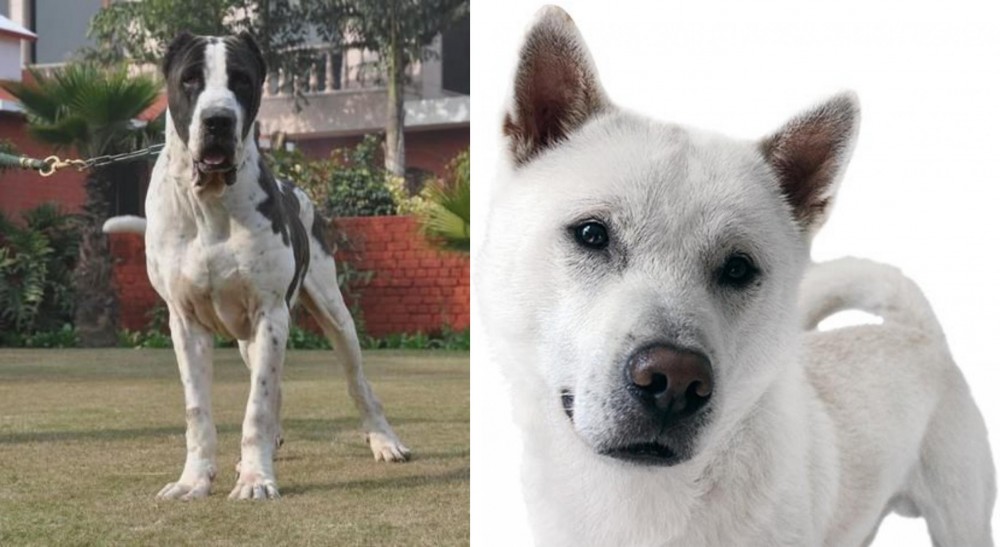 Bully Kutta is originated from India but Kishu is originated from Japan. Bully Kutta may grow 33 cm / 13 inches higher than Kishu. Bully Kutta may weigh 63 kg / 139 pounds more than Kishu. Both Bully Kutta and Kishu has almost same life span. Bully Kutta may have more litter size than Kishu. Bully Kutta requires Low Maintenance. But Kishu requires Moderate Maintenance
Bully Kutta is originated from India but Kishu is originated from Japan. Bully Kutta may grow 33 cm / 13 inches higher than Kishu. Bully Kutta may weigh 63 kg / 139 pounds more than Kishu. Both Bully Kutta and Kishu has almost same life span. Bully Kutta may have more litter size than Kishu. Bully Kutta requires Low Maintenance. But Kishu requires Moderate Maintenance
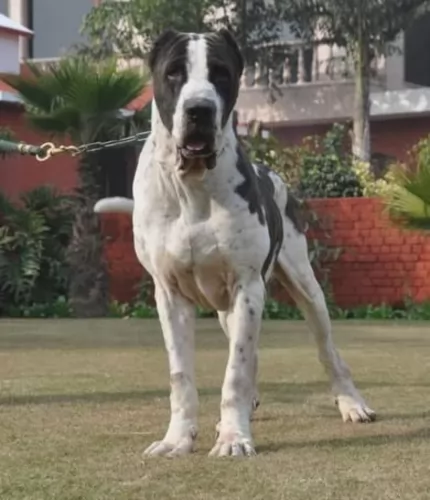 This well built, powerful dog breed is also known as Indian Alangu Mastiff or Pakistani Mastiff. These dogs come from the Punjab and Sindh region of the Indian subcontinent. It is believed that mastiff dogs came with British soldiers during the British invasion, however English Mastiffs, Bulldogs, Bull Terriers and Great Danes are seen as potential ancestors of this large dog.
This well built, powerful dog breed is also known as Indian Alangu Mastiff or Pakistani Mastiff. These dogs come from the Punjab and Sindh region of the Indian subcontinent. It is believed that mastiff dogs came with British soldiers during the British invasion, however English Mastiffs, Bulldogs, Bull Terriers and Great Danes are seen as potential ancestors of this large dog.
There are disputes about the country of origin of this breed, and some people claim that the dog comes from India, while others say it comes from Pakistan. Certainly in Pakistan these dogs are still used for fighting.
 The Kishu is a Spitz type hunting dog that originates from Japan. Many people believe he is a descendant of the wolf. Those who have studied the dog say that it has kept its genetic purity and that there has been very little cross breeding with other dogs.
The Kishu is a Spitz type hunting dog that originates from Japan. Many people believe he is a descendant of the wolf. Those who have studied the dog say that it has kept its genetic purity and that there has been very little cross breeding with other dogs.
The Kishu is also known as the Kumano Ken, a name given after the area the dog originated from. The breed was officially recognized and standardized in 1934, and is known as the Kishu Ken. In 1934 the dog was also designated a Living Natural Monument in Japan and is protected by law.
The dog is also included in the group ‘Asian Spitz and Related Breeds’ class of primitive dogs.
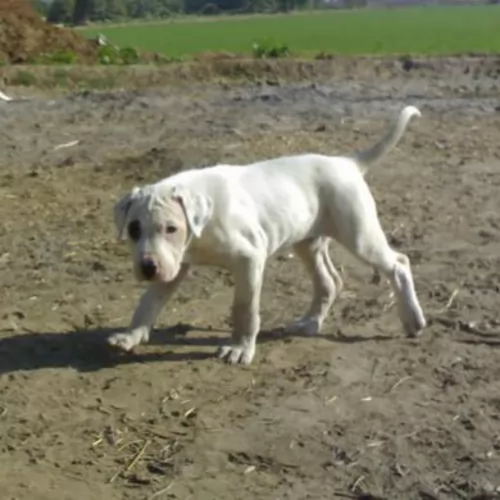 The Bully Kutta is a big, heavy, muscular dog, standing at roughly 81 – 89cm and weighing in at 70–90kg. He isn’t particularly good with children or with other pets simply because the dog is aggressive by nature. If you do opt for this large breed, you’re going to need a large garden and he is going to require a lot of exercise.
The Bully Kutta is a big, heavy, muscular dog, standing at roughly 81 – 89cm and weighing in at 70–90kg. He isn’t particularly good with children or with other pets simply because the dog is aggressive by nature. If you do opt for this large breed, you’re going to need a large garden and he is going to require a lot of exercise.
This is a dog breed that is going to require socialization and training if you want him to be obedient and calm, as he is inclined to be a dominating breed. He’s an intelligent dog and when well trained, he makes a splendid pet with firm, fair owners.
The Bully Kutta has a large, broad head which is supported by a thick well-muscled neck. The skin around his lower jaw is loose. The ears are short, set high and are mostly cropped, but other times they are left to flop over. The tail is sometimes docked but these days mostly left long and tapered.
He has a short smooth coat and is essentially white in color although the coat can also be fawn, brown, black or brindle.
 The Kishu is a medium sized dog standing between 43 – 56cm in height and weight is between 14 – 27kg.
The Kishu is a medium sized dog standing between 43 – 56cm in height and weight is between 14 – 27kg.
He has a short, straight double coat which can be white, red or brindle. The dog has minimal shedding, making him an easy dog to groom.
The nose of the dog is black, but particularly with the white coated dogs, the nose can be brownish or pink in color. The ears are erect and pointed forwards and the tail is carried slightly curved over the dog's back.
The docile Kishu is no pushover and he is a strong minded, courageous dog. He is also an amicable dog breed, getting on well with his human family as well as with other dogs in the home.
He is somewhat aloof and reserved around strangers. Even though he is a docile dog, it is a good idea to have him trained and socialized so that he can be obedient and balanced in all situations.
He is intelligent and learns easily. An interesting aspect with the Kishu Ken is that he likes to take in everything going on from a vantage point, often seeking out a higher spot from where he can look about.
Kishu Kens like to keep an eye on whatever is going on, and sometimes he looks for a high place so that he can survey everything. They can be aloof or shy around strangers.
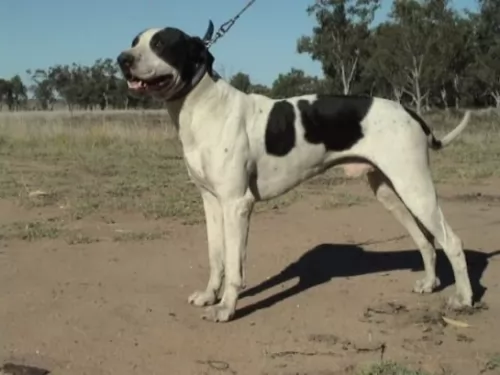 The Bully Kutta is a powerful, imposing dog and they have been nicknamed the ‘Beast from the East’. Unfortunately it is this dog’s thick bones, his looks and his strength that have him used for cruel dog fighting in Pakistan.
The Bully Kutta is a powerful, imposing dog and they have been nicknamed the ‘Beast from the East’. Unfortunately it is this dog’s thick bones, his looks and his strength that have him used for cruel dog fighting in Pakistan.
When not used for fighting, he makes a loyal, devoted companion for the owner who ensures proper socialization and training. Well raised Bully Kuttas are then good with children, being loving, protective and playful.
One just hopes that the future of this giant dog breed is brighter, and that he will be looked upon as more of a companion that just a dog-fighting object to bring in money for his owner.
 The Kishu is a hardy dog breed known for his exceptional hunting instincts and loyalty. He is a brave, clever, playful, tenacious dog eager to please his master.
The Kishu is a hardy dog breed known for his exceptional hunting instincts and loyalty. He is a brave, clever, playful, tenacious dog eager to please his master.
He isn’t so much a hunting dog anymore but is essentially a companion dog, bonding closely with his human family. He will get on well with children and pets in the home, but more so when he has been trained and socialized.
Apart from making a splendid companion, the Kishu promises to be an excellent guard dog to anyone who threatens his human family.
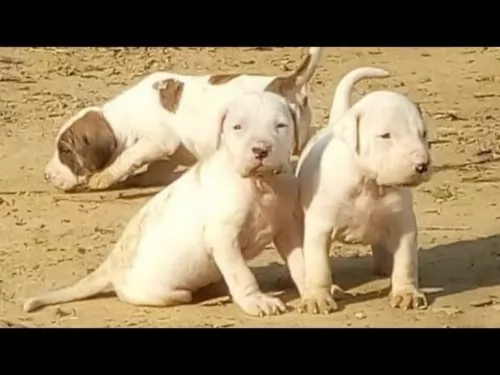 Your Bully Kutta is generally a healthy dog and not often affected by hereditary diseases, but with giant breeds such as this you will have to look out for diseases common to large dogs.
Your Bully Kutta is generally a healthy dog and not often affected by hereditary diseases, but with giant breeds such as this you will have to look out for diseases common to large dogs.
Typical illnesses to watch out for will include hip dysplasia, arthritis, skin allergies and bloat.
This is an inherited condition where the hip joint is improperly formed. For your Bully Kutta it causes wear and tear as well as stiffness in the hips and your dog battles to rise after lying down.
Arthritis in your dog can be managed but it can cause a lot of discomfort for him. This inflammation of the joints can cause pain and stiffness. It is more often seen in older dogs. It can also start at an early age because of problems with bone and joint development and abnormal rubbing within the joint.
Today there are a number of therapy options that can bring some kind of relief to your dog.
 Before you bring a new puppy or rescue dog into your home, you must be prepared for the responsibility of a dog. If you're just simply looking for a watchdog to stick into your backyard, you're being cruel.
Before you bring a new puppy or rescue dog into your home, you must be prepared for the responsibility of a dog. If you're just simply looking for a watchdog to stick into your backyard, you're being cruel.
A dog is a social creature and you need to spend time with them and care for them. Sometimes he can get sick and then you may need to get him to the vet.
Some of the illnesses your Kishu can get will be easily treatable, while others may be life-threatening and require surgery.
The health of your dog will depend a lot on the food you provide it with as well as your lifestyle. Common dog health problems can range from typical eye- and ear infections to bloat, hip dysplasia and cancers.
The thyroid gland doesn’t produce enough thyroid hormone which can lead to other health problems such as tiredness and weight gain. A daily thyroid pill from the vet can help sort this issue out.
This is a common health problem, seen more in older dogs. Your once active dog will move around slower and battle to stand up after lying down.
Arthritis can’t be cured but you can alleviate the pain and suffering. Your vet will tell you that diet and nutrition are important factors to ward off arthritis in the first place.
If your dog has arthritis and is in pain, get him to your vet who can prescribe medications to alleviate the symptoms.
This is a respiratory infection which can be transmitted from one dog to another. You’ll notice coughing, tiredness, runny nose and watery eyes and loss of appetite. Take him to your vet who will know what to do to speed up recovery for your pet.
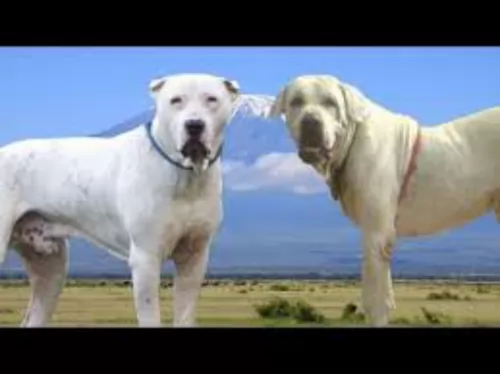 The short coat is low maintenance and as a moderate shedder too, all that is required really is to give your Bully Kutta a good brush twice a week to keep the coat in good condition.
The short coat is low maintenance and as a moderate shedder too, all that is required really is to give your Bully Kutta a good brush twice a week to keep the coat in good condition.
Brush his teeth 2 or 3 times a week with special canine-toothpaste and toothbrush to prevent plaque build-up. He’s a drooler too, so you will need to wipe his face and maybe your clothes of slobber from time to time.
This strong, muscular dog of yours will require an excellent diet. It’s always wonderful if you can give him home-made food such as vegetables, rice and meat. These days you get excellent commercially manufactured food for dogs, and your vet can advise you on the best food for a large, active dog such as the Buly Kutta.
Raw meat is absolutely essential for your dog from time to time and will ensure that his coat doesn’t become dull and with bald spots. Remember, that before dogs were domesticated they used to live on raw meat, so see that he gets some raw meat to prevent skin disorders. Make sure your large pet has a constant supply of fresh, cool water.
Bully Kuttas are going to need a walk every day in the form of exercise. If he is socialized you can take him into the park for ball games. He is a dog that will require plenty of space.
 The Kishu will need to be brushed twice a week to keep the coat free of dust and loose hairs. Their ears should be checked regularly too for wax build up and dirt as ear infections are a common dog illness.
The Kishu will need to be brushed twice a week to keep the coat free of dust and loose hairs. Their ears should be checked regularly too for wax build up and dirt as ear infections are a common dog illness.
Their nails should also be trimmed regularly. Take him regularly to have his teeth cleaned because dental problems can put his entire body at risk for disease.
The Kishu needs a good sized garden to roam. He is best suited to country life because he needs regular exercise. If he lives in the city, put him on a leash and take him for walks.
Apart from exercise, good food is imperative as nutritious food contributes to longevity. Top quality food and the right size portions can ensure lean, energetic, happy, healthy dogs.
Take trouble to understand the ingredients listed on the commercial dog food packaging. Generally the low quality, processed commercial foods are inflammatory.
Even if you go for the top brand kibble, don’t just provide your pet with dry kibble night after night. Mix in some cooked chicken, brown rice and vegetables.
Remember too, that fresh whole foods such as vegetables have live enzymes and are packed full of fiber which is so necessary for digestion. A good diet with fresh, cool water is guaranteed to provide an excellent dimension to your pet’s health.